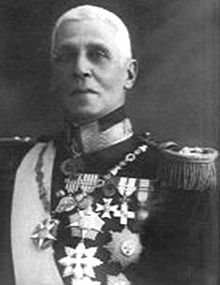You can help expand this article with text translated from the corresponding article in Portuguese. Click [show] for important translation instructions.
|
Domingos Augusto Alves da Costa Oliveira GCTE (Portuguese pronunciation: [duˈmĩɡuʒ ðɐ ˈkɔʃtɐ ɔliˈvɐjɾɐ]; 31 July 1873[2] – 24 December 1957) was a Portuguese general and politician.
Domingos Oliveira | |
|---|---|
 | |
| Prime Minister of Portugal | |
| In office 21 January 1930[1] – 5 July 1932 | |
| President | Óscar Carmona |
| Preceded by | Artur Ivens Ferraz |
| Succeeded by | António de Oliveira Salazar |
| Personal details | |
| Born | 31 July 1873 Lisbon, Portugal |
| Died | 24 December 1957 (aged 84) Lisbon, Portugal |
| Political party | National Union |
Career
editHe was nominated, on 21 January 1930, Prime Minister of Portugal (President of the Council of Ministers) during the period of the Ditadura Nacional (National Dictatorship) that preceded the Estado Novo (New State). A conservative, he opposed all the attempts to restore democracy, like the failed military uprising of April and May 1931 in Madeira and the Azores Islands. The popularity and political role demonstrated by the Finance Minister, António de Oliveira Salazar, led him to resign on 25 June 1932, to be replaced by Salazar, who would retain the post for the following 36 years.
He was awarded the Grand Cross of the Military Order of the Tower and Sword and the Grand Cross of the Military Order of Aviz in 1931.[3]
References
edit- ^ "Governo de Portugal". www.portugal.gov.pt. Retrieved 10 October 2024.
- ^ Serrão, Joaquim Veríssimo (2006). História de Portugal: O terceiro mundo contra o Portugal ultramarino (1951-1960). História política, administrativa e ultramarina (in Brazilian Portuguese). Verbo. p. 208. ISBN 978-972-22-2607-3. Retrieved 10 October 2024.
- ^ "ENTIDADES NACIONAIS AGRACIADAS COM ORDENS PORTUGUESAS". www.ordens.presidencia.pt. Retrieved 10 October 2024.